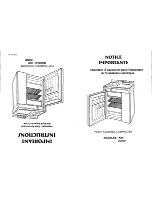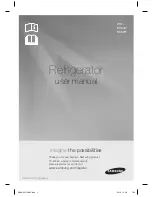
•
Abnormal noise
•
Is refrigerator stable?
•
Does refrigerator reach the wall?
•
Adjusting refrigerator's adjustable feet.
•
Off the wall.
。
•Poor refrigerating
efficiency
•
Do you put hot food or too much food?
•
Do you open the door frequently?
•
Do you clip food bag to the seal of door?
•
Direct sunlight or near a furnace or stove?
•
Is it well-ventilated?
•
Temperature setting in too high?
•
Putting food into refrigerator when hot food
becomes cool.
•
Checking and closing the door.
•
Removing the refrigerator from the heat
source.
•
Emptying the distance to maintain good
ventilation.
•
Setting to the appropriate temperature.
•Peculiar smell in
refrigerator
•
Any spoiled food?
•
Do you need to clean refrigerator?
•
Do you pack food of strong flavors?
•
Throwing away spoiled food.
•
Cleaning refrigerator.
•
Packing food of strong flavors.
Note: If the above descriptions are inapplicable to troubleshooting, do not disassemble and repair it yourself. Repairs
carried out by inexperienced persons may cause injury or serious malfunctioning. Contact the local store where your
purchase was made. This product should be serviced by an authorized engineer and only genuine spare parts should be
used.
When the appliance is not in use for long periods, disconnect from the electricity supply, empty all foods and clean the
appliance, leaving the door ajar to prevent unpleasant smells.
Certifications
Electrical information
This electrical appliance must be grounded.
This product is equipped with a plug, which is suitable for all houses equipped with sockets meeting the current
specifications
If the fitted plug is not suitable for your socket outlets, it should be cut off and carefully disposed of. To avoid a possible
shock hazard, do not insert the discarded plug into a socket.
This product complies the EEC directives.
Safe recovery instructions
Disposal
Old appliances still have some surplus value. An environmentally friendly approach will ensure that valuable raw materials
are recycled.
The refrigerants used in your equipment and insulation materials require special handling procedures. Make sure there is
no pipe damage on the back of the equipment before handling.
Up-to-date information on the options for disposing of old equipment and packaging from old equipment can be obtained
from the local municipal office.
Correct Disposal of this product
This marking indicates that this product should not be disposed with other household wastes
throughout the EU. To prevent possible harm to the environment or human health from uncontrolled
waste disposal, recycle it responsibly to promote the sustainable reuse of material resources. To
return your used device, please use the return and collection systems or contact the retailer where the
product was purchased. They can take this product for environmentally safe recycling.
War nings for disposal
Refrigerant and cyclopentane foaming material used for the refrigerator are flammable. Therefore, when the
refrigerator is scrapped, it shall be kept away from any fire source and be recovered by a special recovering
company with corresponding qualification other than be disposed by combustion, so as to prevent damage to the
environment or any other harm.
When the refrigerator is scrapped, disassemble the doors, and remove gasket of door and shelves; put the doors
and shelves in a proper place, so as to prevent trapping of any child.
Reversing the Door Swing
1. Make sure that your refrigerator is unplugged.
2. Pry hole covers and screws
,
then pry the top cover up
and remove the three screws that secure the upper hinge
to the door, then remove the hinge.



























